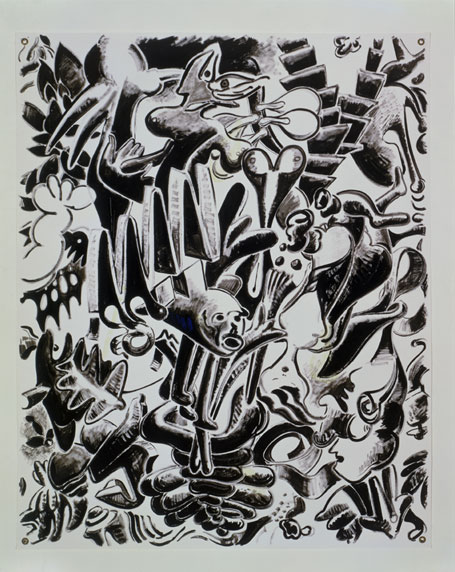M/E/A/N/I/N/G Online #1
Is Resistance Futile?
The Story
The concept of resistance has been current in intellectual circles
for some time, probably from shortly before the French Revolution.
It represented the desire of people to achieve a degree of autonomy
from the powers that dominate their culture.
The premise was that there always is a dominant power and independence from it is always desirable for the person who wants to exercise her or his creative freedom. The sub-premise was that critical observation is the necessary foundation and the companion instrument of independent action. These are modern concepts.
 |
|
The Left
Resistance and other related ideas have been assumed by many to
belong to that area of cultural debate that is still vaguely defined
as the Left, manned by an array of operatives whose inclinations
range from moderate reformism to dogmatic activism against abuse.
But the proprietary claims of the Left over resistance and other attendant ideas have been cracked. The concepts and tactics of the Left are appropriated by groups or individuals with other, often opposite agendas. For instance, Timothy McVeigh, the mass murderer of Oklahoma City, could say that he is an activist of resistance.
The General and
the Specific
For more than two centuries there has been a panicked quest for
some generality we could rely upon for guidance in our individual
and collective doings. This probably stemmed from nostalgia for
times of greater social coherence--the coherence that has been
exploded by the surge of capitalism in the Renaissance. The quest
for general rules was not effective because it resulted in sets
of false certainties.
In fact, in the culture of post-deprivation societies, most of the referential systems many of us still dream of relying upon have been mashed and pulped in a medley of options characterized by ephemeral shifts of value. The mistake is in looking for the general. Resistance itself, like so many other modern ideas, might have become too generic a concept for our day.
If we want to be attentive we must pay attention to the specific moment, the specific place, the temporary situation we are facing or perhaps producing.
The Individual
Specificity is the field where the artist operates. The artist coalesces
the collective and the subjective in her or his research. Every
single work of art is born from a keen awareness of the mental and
physical conditions of its making. From there leaps the inspiration.
One is tempted to say that the ideas of a true and independent artist
are always automatically resistant to any imposition by others.
Packaging
I am tempted to say so but I cannot, because the visual artist nowadays
no longer deludes her--or himself of being independent.
She and he calculate, measure and double-guess their art's compatibility with the rigid rules of the distribution of art, which dictate that art should be packaged in novelty and product-recognition or name-recognition, regardless of the esthetics or ideology represented in it.
Parallels can be seen in other fields. Many musical artists gauge their songs to fit the CD publishers™ format. In the publicity of films, independence has become an artistic formula as much as dependence--just think of the phenomenon of the "indie" movies: they are now seen as possessing a typical style of their own. Accessibility has become a mere variable of inaccessibility. Activism has become just another facet of what's possible, as valuable as escapism.
Some friends tell me that, in the same manner as during the times of old the artist was obliged to submit to the dictates of priest and queen, now s/he must submit to the dictates of the market.
The Margins
Modern artists keep trying to find ways to protect the source of
their feelings, there where intellect and emotions meet. They become
jesters, sacrificial suicides and hermits, or, like I do, operate
at the margins of the dominant bureaucracies of both Left and Right.
The result is self-serving--some call it self-defeating--isolation--until both marginality and isolation may be bought for resale.
Consumer culture, this latest phase of capitalism, consumes ideas, people and thoughts in a rapid turnover. Everything goes out of fashion every 4 months, even critical resistance. But then, because resistance is now a periodized concept, it might be ripe for a revival in the same way as a seventies song can be electronically re-tooled to fit today's radio broadcast formats.
Lucio Pozzi was born in 1935 in Milan, Italy. A US citizen, he lives in New York. These are his main exhibitions for 2002: Museum of New Art, Detroit; William Paterson University of New Jersey; Kalamazoo Institute of Art, MI; Drake University, Des Moines, Iowa. He currently is an instructor at the MFA and BFA programs of the School of Visual Arts, in New York.
| Contents: |
Hi, My Name is Artwork |
Is Resistance Futile? |
Is Resistance Futile? |
Is Resistance Futile? |
The White List |
Have Billboards Changed the Meaning of Public Space in Poland? |